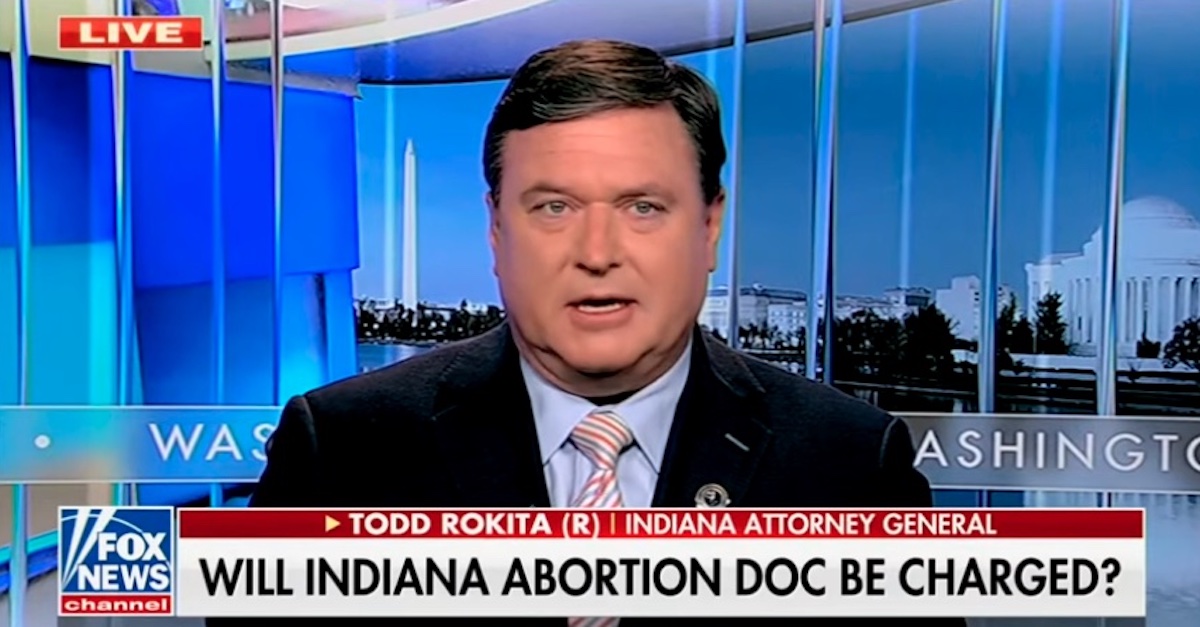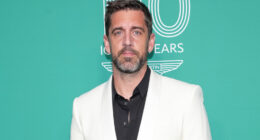
Indiana’s Republican Attorney General Todd Rokita appears on the Fox News Channel on July 13, 2022 (YouTube/Fox News Channel).
Indiana Attorney General Todd Rokita has dropped a lawsuit against the hospital he once said violated patient privacy laws when a doctor told a newspaper that a 10-year-old rape victim traveled from Ohio to Indiana for an abortion.
The matter gained national attention in 2022 when, after the U.S. Supreme Court ruled there is no constitutionally-protected right to abortion, Dr. Caitlin Bernard told press that she had performed a legal abortion in Indiana on a 10-year-old Ohio girl.
Rokita ultimately filed an administrative complaint against Bernard alleging that the doctor violated state and federal privacy laws by sharing the girl’s story — even though Bernard did not use any specific identifying information — to press. Rokita also accused Bernard of “fail[ing] to uphold legal and Hippocratic responsibilities by exploiting a 10-year-old little girl’s traumatic medical story to the press for her own interests.”
The hospital system backed Bernard and said publicly that it disagreed that the doctor had violated any privacy laws.
In the weeks that followed, Rokita and many others made media appearances in which they discussed Bernard’s actions and other consequences of abortion bans. Bernard remained a key talking point for Rokita.
During a Fox News appearance, Rokita told Jesse Waters, “I’m going to get her,” and indicated that his office had proof that Bernard had violated multiple laws and regulations regarding providing abortion care to patients. Later investigation revealed that Bernard had not violated any laws, and Bernard ultimately sued Rokita for defamation over statement.
An Indiana judge found that Rokita violated state law via his on-air statements. Rokita also faced investigation by the Indiana Supreme Court Disciplinary Commission.
Rokita sued Indiana University Health, Inc. (IUH), and Indiana University Healthcare Associates in 2023 alleging that, “Rather than protecting the patient, the hospital chose to protect the doctor, and itself.” IUH is Indiana’s largest health network and serves over 100,000 patients annually.
IUH moved to dismiss the case in June and a federal judge granted the dismissal motion. However, Rokita sought to continue the litigation and filed an amended complaint in July.
Just weeks later, Rokita’s office changed course and on Aug. 7, voluntarily dismissed the lawsuit, saying that he has now verified that IUH has taken steps since July of 2022 to ensure remedy the wrongdoing he once alleged was committed by Bernard. Rokita said that IUH has trained employees to avoid talking about patients in public areas and has informed employees that they must notify IUH’s corporate communications department if they are contacted by a media source.
In the dismissal filing, Rokita said his office has verified that IUH’s actions “represent efforts to better protect the medical privacy of Indiana residents and other individuals receiving healthcare in Indiana and are not reflective of media statements IU Health has made to the contrary[.]”
Rokita said that after verifying IUH’s steps to correct its errors, “State and judicial resources are better served on other matters,” and withdrew the lawsuit.
Though Rokita appears to have created a narrative via court filings that the hospital system reacted to his legal battle by remedying the deficiencies his office was duty-bound to monitor, IUH said it always had these privacy standards in place.
Indeed, the hospital issued a statement that said it “has and will continue to maintain its robust HIPAA compliance policies and training for its team members, as it has for years.”
The statement further said, “While we are pleased the Indiana Attorney General’s office voluntarily moved to dismiss the case, we are disappointed the state’s limited taxpayer resources were put toward this matter after the first complaint was dismissed by the Court on the merits.”
Rokita’s office said in a statement that the dismissal was a “victory.”
“This is a win for patients, but also for the group’s 36,000 health care providers who can now trust they’ve received accurate training that is consistent with HIPAA privacy laws and Indiana patient confidentiality rules,” the statement read. “One of my office’s main priorities is to protect patient privacy because when it’s not, we no longer have reliable, honest healthcare.”
Have a tip we should know? [email protected]






